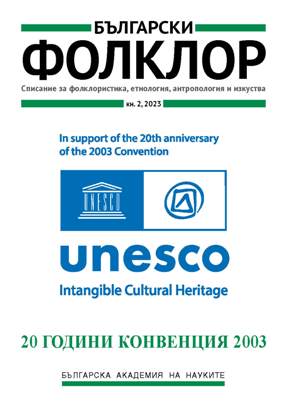Националната система „Живи човешки съкровища – България“ между съхраняването на фолклора и опазването на нематериалното културно наследство
The Living Human Treasures Bulgaria National System: Between the Conservation of Folklore and the Safeguarding of the Intangible Cultural Heritage
Author(s): Iva StanoevaSubject(s): Politics / Political Sciences, Politics, History, Anthropology, Philosophy, Social Sciences, Theatre, Dance, Performing Arts, Education, Law, Constitution, Jurisprudence, Fine Arts / Performing Arts, Cultural history, Museology & Heritage Studies, Customs / Folklore, Media studies, Music, Library and Information Science, Visual Arts, History of Law, International Law, Human Rights and Humanitarian Law, Archiving, Cataloguing, Classification, Preservation, Electronic information storage and retrieval, Education and training, Semiology, Social Philosophy, Political Theory, Governance, Public Law, Communication studies, Sociology, Ethnohistory, History of ideas, Local History / Microhistory, Social history, Recent History (1900 till today), Politics and communication, Politics and society, Cultural Anthropology / Ethnology, Culture and social structure , Theory of Communication, Adult Education, Social development, Management and complex organizations, Rural and urban sociology, Sociology of Culture, Sociology of the arts, business, education, Environmental interactions, Post-War period (1950 - 1989), Transformation Period (1990 - 2010), Present Times (2010 - today), Sociology of Politics, Inclusive Education / Inclusion, Sociology of Art, Sociology of Law, Politics of History/Memory, Politics and Identity, Identity of Collectives, History of Art
Published by: Институт за етнология и фолклористика с Етнографски музей при БАН
Keywords: folklore; conservation; folklore festivals; intangible cultural heritage; safeguarding; 2003 Convention; Living Human Treasures Bulgaria National System
Summary/Abstract: This article reviews two co-existing and mutually conflicting concepts in Bulgaria: the one of folklore and the policies of its conservation in the course of the 20th century, and the one of intangible cultural heritage (ICH) and the efforts for safeguarding it following the adoption, in 2003, of the relevant UNESCO Convention. A comparison is made between the folklore festivals, characteristic of the second half of the 20th century, and the Living Human Treasures Bulgaria National System, created in 2008 as one of the fundamental cultural policies of the Republic of Bulgaria in this sphere, which has resulted in the compiling of the National Representative List of the Intangible Cultural Heritage. Based on observations made during several of its consecutive iterations conducted so far, the article seeks to outline important aspects and issues of the rationalization of ICH and its safeguarding at the present moment. The author draws on her experience as a member of the team of scholars at the Institute of Ethnology and Folklore Studies with Ethnographic Museum of the Bulgarian Academy of Sciences (IEFSEM – BAS), which has been participating actively at expert level in the implementation of the 2003 Convention in Bulgaria.
Journal: Български фолклор
- Issue Year: XLIX/2023
- Issue No: 2
- Page Range: 228-276
- Page Count: 49
- Language: English, Bulgarian
- Content File-PDF

